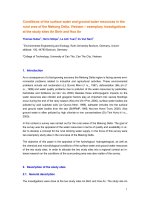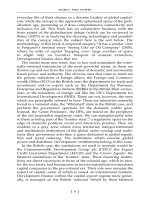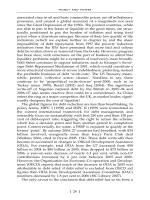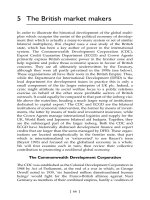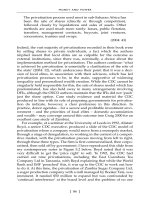Money and Power Great Predators in the Political Economy of Development_13 potx
Bạn đang xem bản rút gọn của tài liệu. Xem và tải ngay bản đầy đủ của tài liệu tại đây (270.62 KB, 17 trang )
Marx, K. (1963 [first published 1852]) The Eighteenth Brumaire of Louis
Bonaparte. New York.
——— (1971) ‘Preface’ to A Contribution to the Critique of Political
Economy, trans. S. W. Ryazanskaya, ed. M. Dobb. London: Lawrence
and Wishart.
Marx, K. and Engels, F. (1970) The German Ideology, ed. and intro. C. J.
Arthur. London: Lawrence & Wishart.
Maurer, B. (2002) ‘Repressed futures: financial derivatives’ theological
unconscious’, Economy and Society, 31(1), pp. 15–36.
Mayer, J. D. (2005) ‘The geographical understanding of HIV/AIDS in
sub-Saharan Africa’, Norsk Geografisk Tidsskrit – Norwegian Journal of
Geography, 59: 1, 6–13
Mbembe, A. (2002) ‘African Modes of Self-Writing’, Public Culture,
14(1), pp. 239–73.
Mellor, J. W. and Masters, W. A. (1991) ‘The Changing roles of Multilat-
eral and Bilateral Foreign Assistance’. In U. Lele and I. Nabi (eds),
Transitions in Development The Role of Aid and Commercial Flows. San
Francisco: International Centre for Economic Growth.
Mendez, R. P. (1992) International Public Finance: A New Perspective
on Global Relations. New York and Oxford: Oxford University Press.
Mhone, G. (2001) Labour Market Discrimination and its Aftermath. United
Nations Research Institute for Social Development, Conference on
Racism and Public Policy, Durban (3–5 September).
Milanovic, B. (2003) ‘The Two Faces of Globalization: Against
Globalization as We Know It’, World Development, 31(4), pp. 667–83.
Mkandawire, T. (2005) ‘Maladjusted African Economies and
Globalization’, Africa Development, 30, pp. 1–2.
Monbiot, G. (2000) Captive State, Palgrave Macmillan Mosley P et al.
(1991) Aid and Power: The World Bank and Policy-based Lending, vol. 1:
Analysis and Policy Proposals. London: Routledge.
Monopolies and Mergers Commission (MMC) (1992) Commonwealth
Development Corporation: A Report on the Efficiency and Costs of, and the
Services Provided by, the Commonwealth Development Corporation
(June). London: HMSO.
Morrissey, O. (2004) ‘Conditionality and Aid Effectiveness Re-evaluated’,
World Economy, 27(2), pp. 153–71.
Mosedale, S. (2008) Women’s Empowerment in Development Theory and
Practice: A Case Study of an International Development Agency.
, PhD Thesis.
Mosley, P. (2001) ‘Making Globalisation Work for the Poor’, New
Political Economy, 6(3), 391–7.
Mosley, P., Harrigan, J. and Toye, J. (1991) Aid and Power: The World
Bank and Policy-based Lending, vol. 1: Analysis and Policy Proposals.
London: Routledge.
BIBLIOGRAPHY
[ 226 ]
Bracking_13_biblio.qxd 12/02/2009 10:53 Page 226
Munck, R. (1984) Politics and Dependency in the Third World: The Case of
Latin America. London: Zed Books.
Murunga, G. R. (2007) ‘Governance and the Politics of Structural
Adjustment in Kenya’. In G. R. Murunga and S. W. Nasong’o, Kenya:
The Struggle for Democracy, pp. 263–300. Dakar: CODESRIA Books
and London: Zed Books.
Murunga, G. R. and Nasong’o, S. W. (2007) Kenya: The Struggle for
Democracy. Dakar: CODESRIA Books and London: Zed Books.
Mwanza, A. M. (1992) Structural Adjustment Programmes in SADC:
Experience and Lessons from Malawi, Tanzania, Zambia and Zimbabwe.
Harare: SAPES Books.
Naidu, S. (2008) ‘India’s Growing African Strategy’, Review of African
Political Economy, 35(115), pp. 116–28.
National Audit Office (NAO) (1989) Report by the Comptroller and
Auditor General, on the efficiency and effectiveness of the Commonwealth
Development Corporation (March), report no. 275. London: HMSO.
Nelson, J. (1990) ‘Introduction: The Politics of Economic Adjustment in
Developing Nations’. In J. Nelson (ed.), Economic Crisis and Policy
Choice. Princeton, Princeton University Press.
North, D. C. (1971) ‘Institutional Change and Economic Growth’,
Journal of Economic History, 31(1), pp. 118–25.
——— (1990) Institutions, Institutional Change and Economic Performance.
Cambridge: Cambridge University Press.
OECD and AfDB (2005) African Economic Outlook 2004/05. Paris: OECD
and AfDB.
Offe, C. (1975) ‘The Theory of the Capitalist State and the Problem of
Policy Formation’. In L. Lindberg et al. (eds), Stress and Contradiction
in Modern Capitalism. Lexington, Mass.: D. H. Heath.
——— (1984) Contradictions of the Welfare State. London: Hutchinson.
Office for National Statistics (ONS) (2008) Foreign Investment Surveys,
at:
——— (2008a) First Release: Foreign Direct Investment 2006. London:
HMSO.
Onimode, B. (1989) The IMF, the World Bank and the African Debt, Volume
1: The Economic Impact. London: Zed Books.
Oppong, J. R. (1998) ‘A vulnerability interpretation of the geography of
HIV/AIDS in Ghana, 1986–1995’, Professional Geographer 50, pp. 437–48.
Organisation for Economic Co-operation and Development (OECD)
(2006) The Challenge of Capacity Development: Working Towards Good
Practice. Paris: OECD.
——— (2007) Business for Development: Fostering the Private Sector. Paris:
OECD Development Centre.
——— (2008) ‘Glossary of Terms’, at: />detail.asp?ID=6043
BIBLIOGRAPHY
[ 227 ]
Bracking_13_biblio.qxd 12/02/2009 10:53 Page 227
——— (2008a) ‘DAC Chair Announces Agreement to Untie Aid to
More Countries’ at: www.oecd.org/document/24/0,3343,en_2649_
18108886_40660248_1_1_1_1,00.html, accessed 5 June 2008.
Orwell, G. (1939) ‘Not Counting Niggers’, The Adelphi (July), at:
www.orwell.ru/library/articles/niggers/english/e_ncn
Palan, R. (2000) Global Political Economy: Contemporary Theories.
London: Routledge.
Payne, A. (2005) The Global Politics of Unequal Development. Basingstoke:
Palgrave Macmillan.
Peta, B. (2008) ‘Mugabe approves indigenous ownership law’, The Star,
at: www.int.iol.co.za/index.php?set_id=1&click_id=68&art_id=
vn20080310060143523C439170
Pieterse, J. N. (2002) ‘Global inequality: bringing politics back in’, Third
World Quarterly, 23(6), pp. 1023–46.
——— (2004) Globalization or Empire? London: Routledge.
Pilger, J. (2007) Freedom Next Time. London: Black Swan.
Pogge, T. W. (2001) ‘Eradicating Systemic Poverty: brief for a global
resources dividend’, Journal of Human Development, 2(1), pp. 59–77.
——— (2002) World Poverty and Human Rights: Cosmopolitan Responsibil-
ities and Reforms. Cambridge: Polity.
Polanyi, K. (2001 [first published 1944]) The Great Transformation: The
Political and Economic Origins of Our Time. Boston, Mass.: Beacon Press.
Porter, T. and Wood, D. (2002) ‘Reform without Representation? The
International and Transnational Dialogue on the Global Financial
Architecture’. In L. E. Armijo (ed.), Debating the Global Financial Archi-
tecture, pp. 236–56. Albany, NY: State University of New York Press.
Power, M. and Mohan, G. with Naidu, S. (eds) (2008) ‘The “New” Face
of China–African Co-operation’, special issue of Review of African
Political Economy, 115.
Prebisch, R. cited at Charlick, R. (2003) ‘Voices of the Third World’, at:
wwwcsuohio.edu/polisci/courses/PSC326/Voices.htm, accessed 9
January 2004.
Radelet, S., Clemens, M. and Bhavnani, R. (2005) ‘Aid and Growth’,
Finance and Development, 42(3), pp. 1–9, at: www.imf.org/
external/pubs/ft/fandd/2005/09/radelet.htm
Rendell, Sir W. (1976) The History of the Commonwealth Development
Corporation. London: Heinemann.
Reno, W. (2000) ‘Clandestine Economies, Violence and States in Africa’,
Journal of International Affairs 53( 2), pp. 433–59.
Riddell, R. C. (2007) Does Foreign Aid Really Work? Oxford: Oxford
University Press.
Rodney, W. (1972) How Europe Underdeveloped Africa. London: Bogle-
L’Ouverture Publications and Dar-Es-Salaam: Tanzanian Publishing
House.
BIBLIOGRAPHY
[ 228 ]
Bracking_13_biblio.qxd 12/02/2009 10:53 Page 228
Rogerson, A., Hewitt, A. and Waldenberg, D. (2004) ‘The International
Aid System 2005–2010: Forces For and Against Change’, Overseas
Development Institution (ODI) Working Paper no. 235. London: ODI.
Roodman, D. (2007) ‘Macro Aid Effectiveness Research: a Guide for the
Perplexed’, Centre for Global Development Working Paper no. 135,
at: accessed 16
July 2008.
Saad-Filho, A. and Johnston, D. (eds) (2004) Neo-Liberalism: a Critical
Reader. London: Pluto Press.
Sachs, J. (2005) The End of Poverty: Economic Possibilities for our Time.
New York: Penguin Books.
Sachs, W. (1999) ‘The archaeology of the development idea’. In W.
Sachs, Planet Dialectics. London: Zed Books.
Said, E. W. (1993) Culture and Imperialism. London: Chatto and Windus.
Santiso, C. (2007) ‘Strengthening checks and balances in financial
governance: The evolving role of multilateral banks in Latin
America’. In S. Bracking (ed.), Corruption and Development: The Anti-
Corruption Campaigns, pp. 273–92. Basingstoke: Palgrave Macmillan.
Scammell, W. M. (1987) The Stability of the International Monetary System.
London: Macmillan.
Schabbel, C. (2007) The Value Chain of Foreign Aid: Development, Poverty
Reduction, and Regional Conditions. Heidelberg: Physica.
Sidell, S. R. (1988) The IMF and Third-World Political Instability: Is There
a Connection? London: Macmillan Press.
Skocpol, T. (1990) ‘Sustainable Social Policy: fighting poverty without
poverty programs’, The American Prospect 1(2), pp. 58–70.
Smyth, R. (1985) ‘Britain’s African colonies and British propaganda
during the Second World War’, Journal of Imperial and Commonwealth
History, 14, pp. 76.
Snidal, D. (1979) ‘Public Goods, Property Rights, and Political Organi-
zations’, International Studies Quarterly, 23(4) (December), pp.
532–66.
Snyder, R. O. (2001) Politics after Neoliberalism: Reregulation in Mexico.
Cambridge: Cambridge University Press.
Soederberg, S. (2002) ‘On the Contradictions of the New International
Financial Architecture: Another Procrustean Bed for Emerging
Markets?’, Third World Quarterly, 23(4), pp. 607–20.
——— (2004) ‘American Empire and “Excluded States”: the Millen-
nium Challenge Account and the Shift to Pre-emptive
Development’, Third World Quarterly, 25(2), pp. 279–302.
——— (2005) ‘Recasting Neoliberal Dominance in the Global South: a
Critique of the Monterrey Consensus’, Alternatives, 30, pp. 325–64.
Sogge, D. (2002) Give and Take: What’s the Matter with Foreign Aid? New
York: St. Martin’s Press.
BIBLIOGRAPHY
[ 229 ]
Bracking_13_biblio.qxd 12/02/2009 10:53 Page 229
Spence, M. (1985) ‘Imperialism and decline: Britain in the 1980s’,
Capital and Class, 25 (spring), pp.117–39.
Spero, J. E. and Hart, J. A. (2003) The Politics of International Economic
Relations, 6
th
edn. Toronto: Thomson Wadsworth.
Standard & Poor’s (2007) Supranational Report, Special Edition
(September).
Stiglitz, J. E. (2001) ‘Foreword’. In K. Polanyi, The Great Transformation: The
Political and Economic Origins of our Time. Boston, Mass.: Beacon Press.
Storey, A. and Williams, S. (2006) An Irish Development Bank? A Paper
Prepared for Dóchas by Andy Storey and Simon Williams, Centre
for Development Studies, UCD, at: www.dochas.ie/documents/
Irish_Development_bank.pdf, accessed 8 June 2008.
Tan, G. (1997) The Economic Transformation of Asia. Singapore: Times
Academic Press.
Tarp, F. (ed.) (2000) Foreign Aid and Development: Lessons Learnt and
Directions for the Future. London: Routledge.
Tarp, F. and Hjertholm, P. (2000) Foreign Aid and Development: Lessons
Learnt and Directions for the Future. London: Routledge.
Tate’s (1992) Export Briefing. London: Tate’s.
Therborn, G. (1982) ‘What Does the Ruling Class Do When it Rules?’.
In A. Giddens and D. Held (eds), Classes, Power, and Conflict: Classical
and Contemporary Debates. Basingstoke: Macmillan.
Thérien, J P. (2002) ‘Debating Foreign Aid: Right and Left’, Third World
Quarterly, 23(3), pp. 449–66.
Thérien, J P. and Lloyd, C. (2000) ‘Development assistance on the
brink’, Third World Quarterly, 21(1), pp. 21–38.
Thomas, A. and Crow, B. (1994) Third World Atlas, 2
nd
edn. Open
University Press.
Tilly, C. (2000) Durable Inequalities. Berkeley, CA: University of
California Press.
Times (2008) ‘Outrage over £200m UK investment in Zimbabwe’, at:
www.timesonline.co.uk/tol/news/world/africa/article4207971.
ece (25 June).
Tollison, R. D. (1982) ‘Rent-Seeking: A Survey,’ Kyklos, 35(4), pp. 575–602.
Touch Base Africa (2008) ‘Nigerian Bank on London Stock Exchange’, at:
www.touchbaseafrica.co.uk/products/business-news.php, accessed
3 June 2008.
Toussaint, E. (2004) Your Money or your Life. Chicago: Haymarket Books.
Tyler, G. (2008). All-Africa Review of Experience with Commercial Agricul-
ture: The Fall and Rise of the Colonial Development Corporation.
Background Paper for the World Bank Competitive Commercial
Agriculture in Sub-Saharan Africa (CCAA) Study, at: http://sitere-
sources.worldbank.org/INTAFRICA/Resources/257994-121545717
8567/CCAA_Success_failure.pdf
BIBLIOGRAPHY
[ 230 ]
Bracking_13_biblio.qxd 12/02/2009 10:53 Page 230
UK Trade and Investment (2008) ‘Talk to Us’, at www.
uktradeinvest.gov.uk/ukti/appmanager/ukti/ourservices?_nfls=
false&_nfpb=true
——— (2008a) ‘Doing Business with Aid Organisations’, at:
www.uktradeinvest.gov.uk/ukti/appmanager/ukti/ourservices?
_nfpb=true&_pageLabel=aid_funded_business&_nfls=false
UNAIDS (2008) ‘HIV Treatment’, at: www.unaids.org/en/PolicyAnd
Practice/HIVTreatment/default.asp
UNCTAD (1994) World Investment Report 1994. New York and Geneva:
United Nations.
UNCTC (1989) Transnational Corporations in World Development: Trends
and Prospects. New York: UNCTC.
UNDP (2000) Human Development Report 2000. New York: Oxford
University Press.
USAID (2007) Global Development Alliance: Expanding the Impact of
Foreign Assistance through Public-Private alliances, Washington D.C.,
at: />Van Belle, D. A., Rioux, J S., and Potter, D. M. (2004) Media, Bureaucra-
cies and Foreign Aid: A Comparative Analysis of the United States, the
United Kingdom, Canada, France and Japan. New York: Palgrave
Macmillan.
van de Walle, N. (2001) African Economies and the Politics of Permanent
Crises, 1977–1999. New York: Cambridge University Press.
War on Want (2006) Globeleq: The Alternative Report, at: www.
waronwant.org/downloads/WoW%20Globeleq%20report.pdf,
accessed 12 June 2008.
Warren, B. (1980) Imperialism: Pioneer of Capitalism, John Sender (ed.)
London: Verso.
Watkins, K. (2004) ‘Africa’s Burden of Debt is still Far Too Heavy’,
Financial Times (22 September).
Weeks, J. (1983) ‘Imperialism and World Market’. In T. Bottomore (ed.),
A Dictionary of Marxist Thought, pp. 223–7. Oxford: Blackwell.
White, H. (1999) ‘Global poverty reduction: are we heading in the right
direction?’, Journal of International Development, 11(4), pp. 503–19.
Williamson, J. (1990) The Progress of Policy Reform in Latin America.
Washington D.C.: Institute for International Economic.
Williamson, O. E. (1985) The Economic Institutions of Capitalism. New
York: Free Press.
——— (2000) ‘The new institutional economics: taking stock, looking
ahead’, Journal of Economic Literature, 38(3) (September), pp. 595–613.
Woolcock, M. (2007) ‘Toward an Economic Sociology of Chronic
Poverty: Enhancing the Rigor and Relevance of Social Theory’,
Working Paper 104. Manchester: IDPM/Chronic Poverty Research
Centre (CPRC).
BIBLIOGRAPHY
[ 231 ]
Bracking_13_biblio.qxd 12/02/2009 10:53 Page 231
World Aid Section (WAS) (1991) EDF 08, European Community-Funded
Aid Projects in Developing Countries: Consultancies, compiled by the UK
Permanent Representation to the European Communities (January).
World Bank (1988) Adjustment Lending. An Evaluation of Ten Years of
Experience. Washington D.C.: World Bank.
——— (1998) Assessing Aid: What Works, What Doesn’t and Why. Oxford:
Oxford University Press.
——— (2005) World Development Report 2006: Equity and Development.
New York: Oxford University Press.
——— (2005a) ‘Projects and Programs’ (in Niger), at: web. world
bank.org/external/default/main?menuPK=382482&pagePK=1411
55&piPK=141124&theSitePK=382450
——— (2007) World Bank Annual Report 2007, IBRD Management’s
Discussion and Analysis, 30
th
June 2007, at: http://siteresources.
worldbank.org/EXTANNREP2K7/Resources/AR07Financial
Statements_Management.pdf, accessed 3 June 2008.
——— (2007a) Special Purpose Financial Statements and Internal Control
Reports of the International Development Association available from
/>/AR07FinancialStatements_IDA.pdf, accessed 4 June 2008.
——— (2007b) IBRD Financial Statements and Internal Control Reports
June 30 2007, at: />NREP2K7/Resources/AR07FinancialStatements_IBRD.pdf,
accessed 4 June 2008.
——— (2008) ‘World Bank Launches $1.2 Billion Fast-Track Facility for
Food Crisis’, Press Release (29 May), at: web.worldbank.org/
WBSITE/EXTERNAL/NEWS/0,,contentMDK:21783685~pagePK:64
257043~piPK:437376~theSitePK:4607,00.html, accessed 4 June 2008.
——— (2008a) ‘Procurement Database’, at: web.worldbank.org/
WBSITE/EXTERNAL/PROJECTS/0,,menuPK:41389~pagePK:9586
3~piPK:95983~tgDetMenuPK:228424~tgProjDetPK:73230~tg
ProjResPK:95917~tgResMenuPK:232168~theSitePK:40941,00.html#
ContractAwards
Xtrakter (2007) [ICMA’s own data service], at: www.xtrakter.com
Zeleza, P. (1993) A Modern Economic History of Africa. Dakar:
CODESRIA.
Zimbabwe Independent (2005) ‘Triangle Next – Mnangagwa’, at:
www.thezimbabweindependent.com/index.php?option=com_
content&view=article&id=11365&catid=31:local-zimbabwe-
stories& Itemid=66 (January)
Zimbabwe Situation (2003) ‘Dabengwa throws hat into the ring’, at:
www.zimbabwesituation.com/jul12a_2003.html
∨∨
Zi
∨∨
zek, S. (2004) ‘From Politics to Biopolitics and Back’, The South
Atlantic Quarterly, 103(2/3), pp. 501–21.
BIBLIOGRAPHY
[ 232 ]
Bracking_13_biblio.qxd 12/02/2009 10:53 Page 232
[ 233 ]
Index
Page numbers in Italics represent
Tables. Page numbers in Bold
represent Figures
accountability 8, 42
accumulation 142–7, 156;
exclusionary 209–10; indicators
208
Actis 76–7, 126–7; infant industries
170–1
Africa: blaming 98–9; disinvestment
159–63; earnings 163; economic
collapse 23; global Keynesian
multiplier 63; health sector 94;
negative perceptions of 40–1;
poverty in 92–109; privatisation
85–6; procurement regulations
135–6; social services 92–3;
underdevelopment 4
African Development Bank (AfDB)
55–6, 126–9; contracts awarded
130; private sector development
128; procurement contracts
117–18; procurement procedures
134–7
African Development Fund (ADF11)
priorities 128
agribusiness 76; Commonwealth
Development Corporation (CDC)
155; investment in 74; Zimbabwe
176
agricultural partnerships 72–3
aid: defining 100–1; discourse on 9;
effect on growth 181–4;
expenditure on 28–9; growth in
104–5; OECD members 105;
spending constraints 113
aid finance 83
aid fungibility 184
aid instruments 182
aid ministries 6
Aid-Funded Business Service 131
Anglo American Corporation 177
anti-corruption policy 135–6
anti-globalisation movement 201–2
anti-market zone 3
antiretroviral treatment (ARV) 94
arms exporters 79
Asian contagion crisis 21; response to
24–5
Asian Development Bank (ADB)
124–6; Afghanistan 146–7
aspiration 96–8
assessment 39–41; fluid 44
assistance: progressive 49
association framework 7
Atlantic Charter 67
Aureos Capital 76
austerity measures 18
autonomy 71
backstop institution 85
bad debt 8
balance 10; achieving 17–18
bank bail-outs 198–9
bankruptcy 59; virtual 60
banks: good 56
beneficiaries 1; pattern of 31
benevolence 3, 100
best value procurement 135
bidding: competitive 129–37
Big Plan 183
bilateral assistance statistics 104–9
bilateral development finance
institutions (DFIs) 7–8; risk
management 49–50
bilateral donors: repaying 56–9
Black Wednesday 21
blame 64, 98–9
boardroom 197
boardroom-level interventions 49
books: balancing 10, 17–18
borrowing: Commonwealth
Development Corporation (CDC)
72; defining 9; government 43
borrowing privilege 32
Botswana Power Corporation 87
bottom billion 183
Bracking_14_index.qxd 13/02/2009 10:55 Page 233
INDEX
[ 234 ]
brands 201
Braudel, F. 3
Bretton Woods institutions 206
buck-passing 199–201
burden 19
burden sharing 54
business principle 144
calculable risk 44–5
callable capital 55
capital: displacing 169–71; financial
8–9
capital export process 60–1
capital flows: augmenting 142
capital markets 151; shared 42
capital relation 33
capitalism 1–2, 187–8; construction of
3; crisis but salvation 207–8;
improving 12; inclusion 189;
managing structures 212
capitalist process 2
capitalist ruling class 156
capitalist state 42–3
catalytic effect 142
causation 64, 93–4; modelling 181
charity 3, 192–3
China: African Development Bank
(AfDB) contracts 128–9; contracts
awarded 120–3
civic action 211
civil works contracts 120; top suppliers
123
class project 37
class structures 44
closed procurement 129–37
co-operative ownership model 191
co-operatives 212–13
COFACE 80
collective action clauses 26
collective surveillance 25
colonial legacy 45–6
colonial resistance 67, 70
commercial activity 102–3
commercial borrowing 9
commercial credit 8–9
commercial deals 166–7
commercial interests 56, 182, 186–7,
193; and development objectives 69
commercial objective 112
commercialisation 86
commodity prices 199
Commonwealth Development
Corporation (CDC) 66–79, 68;
agribusiness 155; debt relief 167;
financial performance 150; Ghana
investment 174–5; privatisation
84–7, 157; profitability 145, 147;
project ownership 169
Commonwealth Development Group
plc (CDG) 6
community-run projects 212
Companhia Do Buzi Sarl 87
companies: advantaged 131–7;
national 151; Northern 114
company financing 48–9
company-level interventions 49
competition: beneficiaries 136;
preventing 46
competition policy 91
competitive advantage 129–37
competitiveness 203
concessional resources transfer 9
concessionality 100–1
concessionary flows 163–4
conditionality 10, 47, 56, 87–8, 182;
and Commonwealth Development
Corporation (CDC) 89–90
conditionality policy 27
conditionality principle 21
confidence 12
confidentiality 162–3
connectivity 98–9
constituencies: domestic 114–23
construction contracts 118
consultancy 82–3
consultancy contracts 119, 120, 133;
Asian Development Bank 124–6,
124; Ghana 173; top countries 122;
World Bank 133
contagion 24
contracts 61; beneficiaries 111, 116–29;
creditor state companies 114;
power 78
contributions 54–5; and leverage
127–8
coordination failures 141
Bracking_14_index.qxd 13/02/2009 10:55 Page 234
INDEX
[ 235 ]
core creditor states 60, 111;
competition between 118–19;
competitive edge 129–31
core-satellite model 70
corporatisation 86
corruption 98, 135–6
cost: socialized 20–1
cost–benefit analysis 181
country debt provisioning 47
country risk: management 47;
perceived 49
credit: access to 18–19; public 53
credit club 54
credit crunch 43, 44–5; multilateral
institutions 57; multilateralisation
of funds 109
crisis but salvation narrative 4–5, 207–9
crony networks 129–37
cross-investment 155
Crown Agents 6, 66, 81–4; emergency
response function 119
Crown Agents Financial Services Ltd
(CAFSL) 82
The Crown Agents for Overseas
Governments and Administrations
Limited 82–3
culture 96–9
currency swaps 48
dam schemes 79
debate: inconclusive 181–5
debt: expansion of 19; multilateral 57;
origins of 169–71; owed to
institutions 164–8
debt assistance 17–19
debt cancellations 148
debt crises 8, 23–5, 56–7; 1980s 10;
response to 151
debt cycle 10
debt management 84
debt reduction figures 26–7
debt relief 25–8, 156, 168, 168; Export
Credit Guarantee Department
(ECGD) 165, 165; International
Monetary Fund (IMF) 57–8, 60
debt repayments 23
debt service repayments 58
debt-servicing problems 51
debt stock 165–6
debt sustainability 57
debt work-outs 26
debt write-offs 166–7
deficit: managing 18
delivery 183
democracy 30, 36–7, 62
democratic deficit 67, 199
democratic reform 210
demonstration effects 142, 144, 169;
Actis 170–1
Department for International
Development (DFID) 66–7; debt
relief 167, 168
dependence theory 188
dependent development 10–11, 11;
market management 36
derivative business 114; African
Development Bank (AfDB) 126–9;
Asian Development Bank 124–6
derivative business benefit 187
derivative contracts 115, 116–29
derivative procurement business 117,
121
development: dependent 10–11, 11;
discourse of 67, 157, 204–5;
fashions in 73–4; and profitability
144–5
development assistance 17–19;
contribution of 99–103
Development Assistance Committee
(DAC) 7; overseas development
assistance (ODA) 106, 107
development failure 3
development fields of action 211
development finance 8–9, 100;
collective management 90–1;
history 19–23, 103–9; objectives
112–13; privatisation 85; raising 82
development finance institutions
(DFIs) 3–4, 6–7, 196; co-operation
151, 155; European 147–9, 152–4;
expansion of 151; financial
performance 150; global Keynesian
multiplier 161; growth of 8;
profitability 147
development finance market 29–33
development narrative 4–5, 207–9
Bracking_14_index.qxd 13/02/2009 10:55 Page 235
INDEX
[ 236 ]
development policy 30–1
development processes 30
development research 95–6
developmental convergence 93
developmental effects 182
developmental objective 112
dictatorship 64
direct project financing 55
dirty industries 42
discourse: dominant 204–5
disinvestment 92, 159–63
displacement 146
displacing capital 169–71
distance theory 94–6
divestiture 86–7
dollar: free-floating 200
domestic interest 186–7
donor darlings 27
donor dependency 142
donor interests 187
donors: new 106; policy leverage 113;
repaying 56–9
double counting 166
DUCROIRE 80
Dutch Disease 184
duty 190–2
early impact aid 185–6
earning ability 18
earnings 163; foreign 182; retained 100
economic deprivation 93
economic enclaves 209
economic justice 97
economic kingdom 64
Economic Recovery Programme
(ERP) 172
Economic Structural Adjustment
Programme (ESAP) era 176
edges 33
efficiency 36, 132, 187
election 42
elites 98; international 196–7; local 86;
power of 32–3; Southern 209–10
empathy 96–8
empire: British 66
empire management 53
enabling business 141
energy contracts 78
energy prices 199
Engineers Against Poverty (EAP) 135
Enhanced Private Sector Assistance
(EPSA) programme 141–2
Enhanced Structural Adjustment
Facility (ESAF) 57, 58
enlarged access policy 21
entrepreneurial effort 37
environmental damage 194–5
equity: intermeshing 61
ethical corporate governance 69
ethical regulation 80
ethics: capitalist 192
European development finance
institutions 147–9, 152–4
European Development Finance
Institutions (EDFI) organisation
151
European Financing Partners (EFP)
151
European Union (EU): procurement
133–4
exchanges: economic 5–6
exclusion 188–90
excuses 98
expected income 44–5
expendability 94–5
exploitation 31, 64, 188–9; benefits of
12
export credit 149
export credit agencies (ECAs) 61,
79–81
Export Credit Guarantee Department
(ECGD) 6, 66, 79–81; debt relief
165, 165; privatisation 84
export credit institutions 8
export departments 6
Export-Import Bank (Eximbank) 149
export insurance 41–2
export quotas 178
export subsidies 79–81
extended fund facility 21
external payments balance 10, 17–18
failure 3
fairness 163–4
fields of action 211
figures: official 102–3
Bracking_14_index.qxd 13/02/2009 10:55 Page 236
INDEX
[ 237 ]
finance availability 17
financial architecture reform 24
financial control 21–2
financial crisis 198–202
Financial Stability Forum (FSF) 25
firms: national 151; opposition to 201,
see also company
first-line liquidity 18–19
Flamingo Holdings 170–1
food 200
food aid 115
food crisis 109
foreign affairs ministries 6
foreign contractors 135
Foreign Credit Insurance Association
(FCIA) 149
foreign direct investment (FDI) 10–11,
22–3, 162; African countries 161
foreign exchange shortage 159
France: derivative business 117
free market: advocating 142; extension
of 9
free trade subsidy 81
freedom 37
frontier institutions 7–8, 84–9; stored
debts 164–5
frontier state 6; internationalised 66
fuel 199–200
functionalism 12
fund of funds 77
G20 24–5
generosity 64, 103, 166–7; inflated 101
geostrategic interests 56, 112, 193
Germany: aid spending 116
Ghana: Commonwealth Development
Corporation (CDC) investment
174–5; structural adjustment 172–3
Global Development Alliance (GDA)
business model 89
global Keynesian multiplier 61–2, 63
Global Resources Dividend (GRD)
191–2
Global Shadows (Ferguson) 96–8
Globeleq 77–8, 126–7
goods: desired 93
goods contracts 120; Asian
Development Bank 124–6, 124; top
suppliers 123
governance 30; aid 184–5; and growth
182
government: borrowing by 43;
corrupt 98; interference by 71;
lending to 74; relations with 171;
reliance on 50; support by 197
government guarantees 41–4
grant assistance 103
grants 148, 182
Great Predators 3–4, 6–7, 158;
economic opportunities 137; as
market makers 38; recycling funds
127
Great Providers 212
growth 181–4, 193, 208
guarantees 41–4; core creditor states
60; government 41–4
Halifax Summit: (1995) 24; (1997) 57
hand-outs 191
hard currency 19
hard infrastructure investment 194
health sector: Africa 94
help 192
HERMES 80
hierarchy: socio-economic 93, 96–8
highly indebted poor countries: debt
relief 167
Highly Indebted Poor Country
Initiative (HIPC) 22, 113
Hippo Valley Estates 177
historical connectivity 98–9
HIV/AIDS 94
human development index (HDI) 92
humanitarian aid 185
ideological hegemony 22, 85
ideological interests 112
ideology 204
imperial markets 46
imperialism: theories of 202–4
imperialist relations 1
imports 20
in-country procurement systems 135
inclusion 96–8, 188–90
income: expected 44–5
incomplete markets 38
Bracking_14_index.qxd 13/02/2009 10:55 Page 237
INDEX
[ 238 ]
independence: undermining 22
independent territories 70–1
India: contracts awarded 120–3
industrial strength 116
inelastic demand 199
inequality 96–8, 187; increasing 31;
perceived 93; radical 190–1;
reinforced 32–3; remaking 203
inequality traps 12, 95
inflation 19, 199
infrastructure investment 194
infrastructure spending 128
injustice 190
instability 24
Institution of Civil Engineers (ICE)
135
institution first approach 59
institutions: externally oriented 6;
frontier 7–8; global economic 5–7;
habituated 206; importance of
9–12; imposed 191; Karl Marx
205–6; owed debt 164–8; public 42;
regulatory 197; third-wave
building 12
Interact Group 151, 155
interest rate swaps 48
interest rates 20, 200
interests: collectivised 158; divergent
145–6
International Bank for Reconstruction
and Development (IBRD) 89–90
international borrowing privilege 32
International Capital Market
Association (ICMA) 28
International ECA Reform Campaign
81
International Finance Corporation
(IFC) 36, 48–51; contributions to 55
international financial institutions
(IFIs) 61; democratising 201–2;
Overseas Development Assistance
(ODA) 101–3; profitability 114
International Monetary Fund (IMF) 7,
11; debt relief 57–8, 60; money
dispersal 54; United States
influence 116
intervention 197; deepened 60; direct
140–1
intervention programme 49
investment: abroad 160; and
adjustments 171–2; arbitrary
decision-making 50; and certainty
39–41; clustered 146; independent
countries 71; location choices
114–15; outward 159–60; sub-
Saharan Africa 22
investment climate approach 140
investment climate effects 113
investment departments 6
investment flows 161
investment insurance 149
investment patterns 35
investment positions 161, 164
investor perceptions 40–1
isolation 94–5
Japan: aid spending 116
Kariba Dam project 72
Kariba North Bank Co. Ltd 87
Kenya 50–1; investment in 161; tea
development project 73
Keynesian multiplier 61–2
Keynesianism 206
Kilombero Sugar Company 72
land disputes 177
late impact aid 185
leaders 209–10
lenders: priorities 112
liabilities 104; historic 165–7; inter-
institutional transfers 58; transfer
of 8
liberalisation 129
liberalisation policies 31
liberation movements 209
likeness 96–8
liquidity: collective management
90–1; debtor countries 60; extended
24; first-line 18–19; gatekeeper 79;
public 4; regulating 9, 140
liquidity backstops 48, 141
liquidity crisis 12
liquidity injection 182
lives: expendable 94
living standards 70
Bracking_14_index.qxd 13/02/2009 10:55 Page 238
INDEX
[ 239 ]
local participation 70
local procurement 135, 136
loss: carrying 59
lowest price procurement 135
lumpy nodes 5–6
Malawi: structural adjustment 173–6
manufacturing decline 118
marginalisation 23
market development approach 140
market distortions 146–7
market makers 38–9; and sovereign
political risk 45–7
market making 113
market management 36
marketing 157–8
markets 35–9; saturated 169; shared 42
Marxism 188
Marxist conundrum 31, see also
exploitation
material life 3
merchant bankers 156–7
Mhlume Sugar Ltd 169
military spending 29, 184
Millennium Development Goals
(MDG) 28–9, 99
mining contracts 78
missing middle 158, 178
money 8–9
monopoly state 203
Monterry Consensus 28
moral case 190–4
moral universe 96
multilateral agency types 101
multilateral assistance statistics 104–9
Multilateral Debt Relief Initiative
(MDRI) 27, 167
multilateral development agencies:
expenditure 115, 137
multilateral development finance
103–9
multilateral financial institutions 7–8;
repayments to 56–9
multilateralism 114–23
multiplier effect 20
narratives 207–10
national shares 114–23
nationalistic model 74
negative duty 190–2
negative resource flows 104–5
negotiation 211
neoclassical economics 21, 113, 186;
salvation 208
neoliberalism 31, 84–9; approach to
poverty 79; codification of 146; and
regulation 197–8
net disbursements 103
net receipts 53–4
new economic institutionalism 205
new international economic order
(NIEO) 196
New International Financial
Architecture (NIFA) 14
New Partner for Africa’s
Development (NEPAD) 128
New Public Management (NPM)
agenda 83
Niger famine 88
Nigeria: debt cancellation 84;
investment in 161
nodes 5–6
non-concessional funds 100–1
non-displacement provision 144
non-intervention 98
Northern companies 114
Northern Rock 44
occupied territories 46
Official Development Assistance
(ODA) 26, 100–3; debt write-offs
166; Development Assistance
Committee (DAC) 106, 107; figures
28–9, increase in 104; multilateral
agencies 107, 108
Official Development Finance (ODF)
100–3
oil prices 200
oil shocks 19
open tendering 132
opportunities: closed 196
oppositionalism 202
Other Official Flows (OOF) 100–1;
donor flows 107
Overseas Private Investment
Corporation (OPIC) 149
Bracking_14_index.qxd 13/02/2009 10:55 Page 239
INDEX
[ 240 ]
owners: powerful 56–61
ownership: concentrated 88; private
37
Paris Declaration on Aid Effectiveness
(2005) 183
payments position 163
perceptions 40–1
phantom aid 30, 168
pick and mix approach 181, 183
place 96–9
plan 183
plantation agriculture companies 145
plantation agriculture investments 74
policy agendas 83
policy environments 184–5
policy incoherence 30–1
policy leverage: donors 113
political correctness 97
political economy of development
210–13
political influence 116
political kingdom 63
political relations 134
political risk 44–5, 50
political technology 211
politics 202–7
poor: experience of 205; increased
poverty of 17; romanticised 209
poorest: multilateral aid 113;
representing 188–90
positive duty 190–2
post-structural analysis 204
poverty 96–9; cause of 64; constructed
4; increased 17; neoliberal
approach 79; production of 191;
and profits 85; relational 93–4;
structural 191
Poverty Reduction Strategy Papers
(PRSPs) 22
poverty trap 188–9
power 204; balance of 25; elite 32–3;
relations of 1; sharing 7; structures
of 5–7; symbolic 157; theories of
204; unequal 90, 187, 197, 203;
within markets 36–8
power assets 77–8
power relations 211–12
price rises 199
primary commodity production 189
primary producers 46; interests of 69
private equity investor 76
Private Export Funding Corporation
(PEFCO) 149
private finance 17–19
private flows comparison 163
private lending 24
private ownership 37
private philanthropy 115
private rating 59
private sector 2; aid to 194;
Commonwealth Development
Corporation (CDC) co-operation
73; debt write-offs 166–8; projects
with 75
private sector development (PSD) 189;
African Development Bank (AfDB)
128; Britain 171–8; Commonwealth
Development Corporation (CDC)
155–6; concepts 143; instruments
112, 140–2, 158
private sector finance 156
private voluntary sector 62
privatisation 48, 83; Commonwealth
Development Corporation (CDC)
75, 84–7, 157; as a condition 87–8;
forced 27
privilege 159
procurement: closed 129–37
procurement contracts 117–18
procurement provisions 132
procurement selection 133
production under licence 35
profit repatriation 137–8
profitability 208; and development
144–5; weak markets 38
profitable aid 186
profits 61; and poverty reduction 85
progress 1
provisioning 47, 54–5, 148
proximity 134
psychological damage 192
public goods 43–4, 59; global 99
public relations 157, 192
public risks regime 41–2
public sector: debt relief 168;
Bracking_14_index.qxd 13/02/2009 10:55 Page 240
INDEX
[ 241 ]
partnership with Commonwealth
Development Corporation (CDC)
74
public subsidy 40, 43; Northern firms
137
public support 114–15
public-private partnership (PPP) 88–9
qualification procedures 132
qualitative assessment 40
radicals 1
rank: socio-economic 96–8
rate of return 44
receipts net 59
recession 20, 26
records: misleading 102–3
recycling funds 125, 172; Great
Predators 127
reform 24, 206–7; democratic 201;
economic 172
registration technicalities 132
regression analysis 181
regulation: avoiding 80; banking 47;
growth of 9–12; importance of 202;
inadequate 29; system of 2
regulatory space 6
reinvestment cycle 50–1
relationships: forming 97–8
religions 1
rent-seeking 43
rent-taking 40
reparations 46
repayments 56–9, 103, 104
reporting error 102–3
reputation 48, 146, 149–51, 201;
damage to 60
research 95–6; aid effectiveness 185–8
resistance but subordination narrative
4–5, 186, 209–10
resolutionism 98
resource allocation 99–100
resource flows: negative 104–5
resource privilege 32
respectability 207
responsibility 190
returns: high 163
revolution 206–7
rights-based development 192
risk 39–47; displacing 144–5; high 163;
institutionalising 61; reducing 56,
171
risk assessment 39–41; fluid 44
ruling class 156
rural development 74
searchers approach 183
second-line liquidity 18–19, 100
securities market 27–8
security interests 147
security-related aid 115
service delivery failure 94
severely indebted low income
countries (SILICs) 57
shares: national 114–23
shock doctrine 198
size 132, 158, 177
small- and medium-sized enterprises
(SMEs) 212
social conflict 113
social crisis 23–4
social development 189
social exclusion 188
social movement resistance 201
social relations 37, 38; benign 188
social responsibility 79
social spending 92
social welfare 31–2
socialisation of cost 20–1
socio-economic hierarchy 93, 96–8
soft currency state 61
solidarity 189
Soloman Islands Plantations Ltd 169
South Africa 126; investment in 161–2;
investment in Zimbabwe 178
sovereign economies 48–51
sovereign political risk 45–7
sovereign wealth funds 62, 198–9
sovereignty: erosion of 21–2; and
globalisation conflict 29–30
special drawing rights (SDRs) 53
speculative trading 25
spending constraints 113
stability 24–5
stand-by agreements 21
state institutions 6
Bracking_14_index.qxd 13/02/2009 10:55 Page 241
state power 203
state-led development 74
statistics: misleading 102–3
sterling: drawing 54
structural adjustment 10, 17–18, 21;
benefits of 171–2; negotiations 56–7
structural adjustment programmes
(SAPs) 21
structural poverty 192
structural problems 194
structural relationships 32
struggles: concretised 205–6
sub-prime crisis 21, 25–6
subcontracting 35
subordination 96–7, 186
subsidy 140–1; dependence on 142–3;
public 40, 43, 137
substitutable financial products 28
sugar industry 177–8
supply contracts 118
surveillance 25
symbolic violence 192–3
system stability 23–5
systemic importance 25
Tanganyika Wattle 169
Tanzania: structural adjustment 173–6
technical assistance contracts 119
technical assistance projects 88; Asian
Development Bank 125–6
technical language 33
territorial control 45–6
Tongaat Hullet 177
toxic debt 45
trade departments 6
trade unions 189; resistance 211
traditional life 97
Triangle Sugar 177
Triple-A rating 55, 59, 151
Truman, President H. S. 67
trustworthiness 146
Turkey 48
Uganda: structural adjustment 173–6
Umeme 78, 127
uncertainty 44–5
unconditional aid 184
underdevelopment 4
underwriting 53–61
united aid 133
United Nations (UN) agencies 101–2
United States: export credit 149;
multilateral aid 115–16
unpaid proportion 55
use values: finite 208–9
usable capital 56
Usutu Pulp Company 148, 169
value 61; recycling 63
virtual bankruptcy 60
vulnerability 95, 199–200
vulture fund attacks 25–6
water sector investment 87–8
weak markets 38
wealthy 1
weapons exports 79–80
welfarist missions 112–13
wellbeing indicator 208
The White Man’s Burden (Easterly)
183
windfall waste problem 146
workers 1
working markets 37–9
World Bank 7; civil works contracts
123; co-operation with
Commonwealth Development
Corporation (CDC) 72–3;
consultancy contracts 122;
contracts awarded 122; contracts
awarded to creditor states 118–20;
contributions to 54–5; debt relief
167; goods contracts 123;
procurement database 132–3;
procurement selection 133; United
States influence 116
World Social Forum 202
world-class sectors 75
write-downs: commercial 25–8
Zambia: structural adjustment 173–6
Zambia Sugar Company Ltd 86
Zimbabwe 126; structural adjustment
176–8
INDEX
[ 242 ]
Bracking_14_index.qxd 13/02/2009 10:55 Page 242

